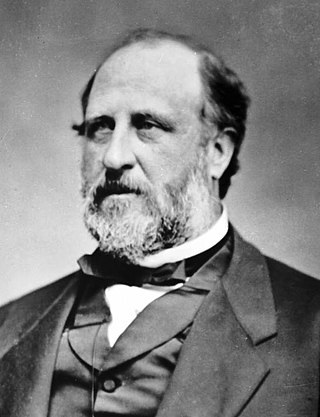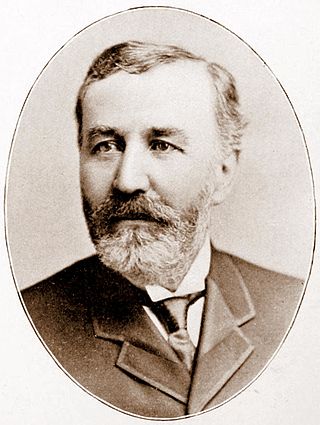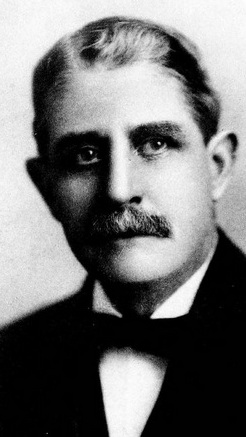
Maurice Featherson (November 1862 – December 12, 1953) was an American politician from New York.

Maurice Featherson (November 1862 – December 12, 1953) was an American politician from New York.
Featherson was born in November 1862 in New York City. He attended the public schools, and then became a machinist, and later a master machinist, of the New York City Fire Department. He joined Tammany Hall, and became President of the New York Sand and Gravel Company, and was connected with the Uvalde Asphalt Paving Company. Both companies took part in public works in New York City.
Featherson was a member of the New York State Senate (18th D.) from 1896 to 1900, sitting in the 119th, 120th, 121st, 122nd, 123rd New York State Legislatures.
In 1904, he was appointed by Mayor George B. McClellan as Commissioner of Docks and Ferries, and remained in office until the end of 1905.
He died on December 12, 1953, in New York City. [1]

William Magear Tweed, often erroneously referred to as William "Marcy" Tweed, and widely known as "Boss" Tweed, was an American politician most notable for being the political boss of Tammany Hall, the Democratic Party's political machine that played a major role in the politics of 19th-century New York City and state.

Vincent Richard Impellitteri was an American politician and judge who served as the 101st Mayor of New York City, 1950–53. He was elected as a Democrat as president of the City Council in 1945, and reelected in 1949. When Mayor William O'Dwyer resigned in 1950, he became acting mayor. He lost the Democratic primary for the nomination for a full term but was subsequently elected mayor on a new ticket, the "Experience Party". He lost the Democratic primary when he ran for reelection in 1953, and became a judge in 1954.

Tammany Hall, also known as the Society of St. Tammany, the Sons of St. Tammany, or the Columbian Order, was an American political organization founded in 1786 and incorporated on May 12, 1789, as the Tammany Society. It became the main local political machine of the Democratic Party and played a major role in controlling New York City and New York State politics, and helped immigrants, most notably the Irish, rise in American politics into the 1960s. Tammany typically controlled Democratic nominations and political patronage in Manhattan after the mayoral victory of Fernando Wood in 1854, and used its patronage resources to build a loyal, well-rewarded core of district and precinct leaders; after 1850 the vast majority were Irish Catholics due to mass immigration from Ireland during and after the Irish Famine.

Franklin Edson was an American merchant who served as the 85th Mayor of New York from 1883 to 1884.

Robert Ferdinand Wagner I was an American politician. He was a Democratic U.S. Senator from New York from 1927 to 1949.

Lucius Robinson was an American lawyer and politician. He was the 26th Governor of New York from 1877 to 1879.

Carmine Gerard DeSapio was an American politician from New York City. He was the last head of the Tammany Hall political machine to dominate municipal politics.

Richard Welstead Croker, known as "Boss Croker", was an Irish American political boss who was a leader of New York City's Tammany Hall. His control over the city was cemented with the 1897 election of Robert A. Van Wyck as the first mayor of all five boroughs. During his tenure as Grand Sachem, Boss Croker garnered a reputation for corruption and ruthlessness and was frequently the subject of investigations. As his power waned following the 1900 and 1901 elections, Croker resigned his position and returned to Ireland, where he spent the rest of his life.

William Hull Wickham was the 81st Mayor of New York City and anti-Ring Democrat who helped to topple corrupt politician Boss Tweed.

William Lafayette Strong was the 90th Mayor of New York City from 1895 to 1897. He was the last mayor of New York City before the consolidation of the City of Greater New York on January 1, 1898.

James Aloysius O'Gorman was an American attorney, judge, and politician from New York. A Democrat, he is most notable for his service as a United States Senator from March 31, 1911 to March 3, 1917.

Edward Swann was an American lawyer, jurist, and politician from New York. From November 4, 1902, to March 3, 1903, he served part of one term in the U.S. House of Representatives.

Joseph Rowan was an American lawyer, banker, and politician who served one term as a U.S. Representative from New York from 1919 to 1921.

The New York County District Attorney, also known as the Manhattan District Attorney, is the elected district attorney for New York County (Manhattan), New York. The office is responsible for the prosecution of violations of New York state laws. The current district attorney is Alvin Bragg. He was elected in 2021 to succeed Cyrus Vance Jr.

The Commissioner of Docks of New York City was the head of the Department of Docks created by the New York State Legislature's 1870 revision of the New York City Charter, which returned numerous powers to the city government that had previously been taken by the state. This version of the city charter was known as the "Tweed Charter", after its main advocate William M. "Boss" Tweed, who controlled much of local politics via the Tammany Hall political ring. At the time the charter revision passed, he was a state senator representing the Fourth District in Manhattan.
Hulan Edwin Jack was a prominent Saint Lucian-born New York politician who in 1954 became the highest ranking Caribbean American municipal official up until that time, when he was elected Borough President of Manhattan.

Nelson Jarvis Waterbury was an American lawyer and politician from New York.

John F. Ahearn was an American politician and publisher. A prominent New York City political figure and a member of the Tammany Hall political machine, he served in the New York State Assembly, the New York State Senate, and as Manhattan Borough President. He was owner of the T. J. Hayes Printing Company which published plays and other works related to the theatre.

The New York City mayoral election of 1961 occurred on Tuesday, November 7, 1961. Incumbent Democratic Mayor Robert F. Wagner, Jr. won a decisive re-election victory for a third term in office. Wagner defeated the Republican nominee, state Attorney General Louis J. Lefkowitz, and the Citizens Party nominee, New York City Comptroller Lawrence E. Gerosa. Wagner received 51.03% of the vote to Lefkowitz's 34.46%, a Democratic victory margin of 16.57%.

44 Union Square, also known as 100 East 17th Street and the Tammany Hall Building, is a three-story building at 44 Union Square East in Union Square, Manhattan, in New York City. It is at the southeast corner of Union Square East/Park Avenue South and East 17th Street. The neo-Georgian structure was erected in 1928–1929 and designed by architects Thompson, Holmes & Converse and Charles B. Meyers for the Tammany Society political organization, also known as Tammany Hall. It is the organization's oldest surviving headquarters building.